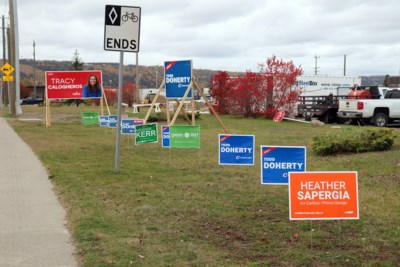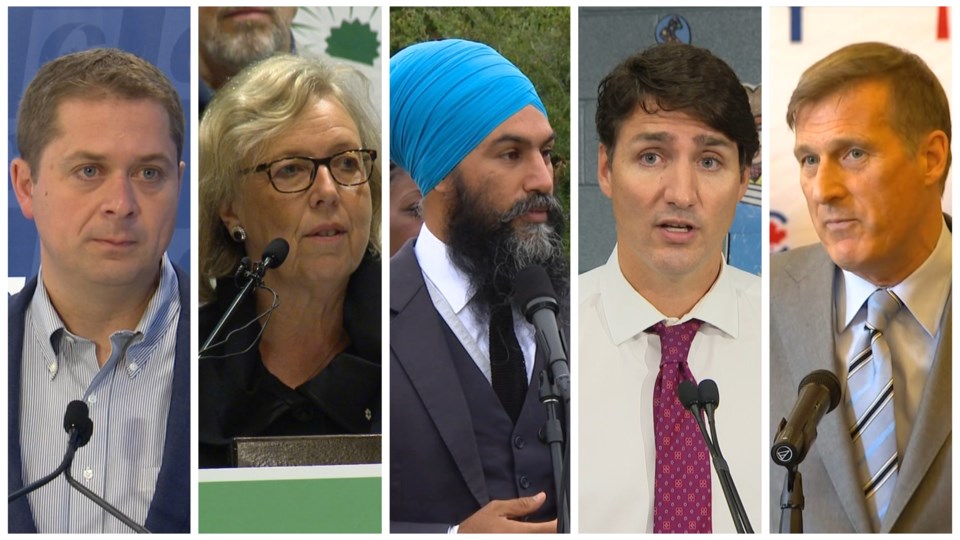No matter where you sit on the political spectrum, it’s important to take a good look at what each party is promising before you make your journey to the polling stations on Monday, Oct. 21.
 Campaign signs spotted in the Cariboo- Prince George riding during the 2019 Federal election. (via Hanna Petersen)
Campaign signs spotted in the Cariboo- Prince George riding during the 2019 Federal election. (via Hanna Petersen)“For voters, I think what is more important is they understand the issues and the platforms and what the different parties are proposing to do if they got elected to government,” says Dr. Gary Wilson, a political science professor at the University of Northern British Columbia (UNBC) in an interview with PrinceGeorgeMatters.
“If you want to understand this particular election, your first step should be informing yourselves about what the parties are proposing to do and then deciding which party best fits my views.”
However, Wilson also notes that similarities exist across platforms because most political parties are looking to capture the majority of voters that exist in the centre of the spectrum.
“They are all sort of going after the same voters - the people who exist in the centre are fairly moderate,” says Wilson. “You see a lot of this election focused on the middle-class and middle-class voters and most Canadians would describe themselves as middle-class even though the spectrum of the middle-class is actually quite wide.”
With only a few days left before the big day, sorting through the key similarities and differences between all six parties can be quite the undertaking, but we’ve assembled everything we think you’ll need to do your last-minute research and cast your vote with the confidence of being fully informed.
Party Platforms
To understand each platform, the best method is probably to simply read through the platforms themselves.
Each party has its platform published on its website:
- Liberal Party of Canada
- Conservative Party of Canada
- New Democratic Party
- Green Party of Canada
- People’s Party of Canada
However, reading through each political party’s platform in its entirely amounts to hundreds of pages of reading and analyzing and is not a realistic accomplishment for the majority of voters.
Maclean’s has published a 2019 federal election platform guide: Where the parties stand on everything, which is a list that compares each political party’s platform and is searchable by issue.
This way you can look up where each party stands on the issues important to you.
Party Leaders
The importance of party leaders can’t be underestimated during an election cycle either, as one of the leaders will become the next Prime Minister. A great way to understand who the party leaders are and where they stand on issues is to watch the Federal leadership debates. If you missed watching the English language debate which was broadcast on Oct. 8, you can catch up online.
Election quizzes
Election quizzes are an interactive way to help you decide which party best suits your views. Tools like Vote Compass, which is a civic engagement application developed by political scientists, help people understand how their views align with the candidates running. You can take a Vote Compass quiz about the 2019 Canadian Federal Election online. Completing the quiz will give you a percentage telling you how much you agree with each party.
Campaign promises
Throughout the election cycle, party leaders have been making promises along the campaign trail. It can be tough to remember who promised what and when. Here’s a list that breaks down each party promise made.
Local candidates
Knowing who the local candidates are in your riding is also extremely important as whoever wins your riding will become your Member of Parliament, representing the issues facing your region at the federal level. If you want to get to know the candidates in the Cariboo-Prince George and Prince George-Peace River-Northern Rockies ridings, you can watch the local debates or read their candidate interviews.
Casting your vote
General voting takes place on Oct. 21. Once you know who you’re voting for, make sure you have everything you need in order to vote and know where to go. If you’re unsure about any of that, you can read our detailed voting guide.





.jpg;w=120;h=80;mode=crop)



